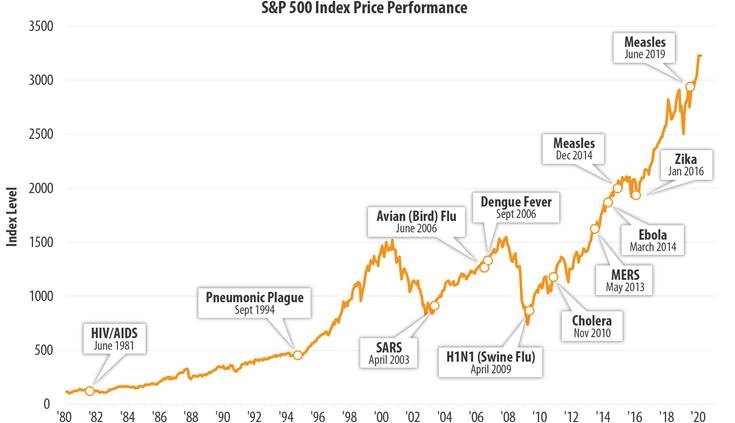Improving Investor Behavior – Investing in Panic
A lot can change in 30 days. One short month ago, markets were knocking on the door of all-time highs, businesses were doing well, and Joe Biden was behind several candidates in the Democratic primaries.
Oh, how things change quickly. Very quickly.
Even when compared to historic drops, the decline of about 18 percent that we’ve seen in the broad market indices took only 13 days. The start of the Great Depression took 28 days to reach that level. In 1998, it took 31 days. The Great Recession didn’t even make it in the top five fastest drops.
I want to focus on two questions in this column: First, to what can this speed of this market drop be attributed; and second, is it warranted?
All dramas need a villain. This time it’s the Coronavirus. The rapid spread of the virus led to ghost towns (Wuhan), which in turn led to locking down an entire country (Italy). This is a serious virus, and any amount of death or damage caused by it is too much. I don’t intend to trivialize it, nor the efforts of healthcare workers around the world fighting on the front lines.
But as investors, we have a mandate to try and understand where to draw the line between reasonable concern and emotion-driven panic. Too much emotion leads to panic selling, which in turn creates opportunities for those willing to buy when others are fearful.

I’d argue that we are well over the line of reasonable concern and deep into an emotional panic. During the 2008-2009 recession, corporate profits declined 46 percent, according to Brian Wesbury, Chief Economist at First Trust. Comparably, the current declines point to an estimated profit decline of 50-80 percent. Effectively, the market is saying that Coronavirus will have a greater effect on American businesses than the Great Recession, a time in which the entire monetary system seemed to be teetering on edge.
Consider these five critical elements of an economy: The Federal Reserve, taxes, regulatory policy, trade policy, and spending. What’s the status of these? The Federal Reserve just announced yet another cut to rates last week, making them even more accommodative than they already were. We just passed significant tax reform two years ago. Burdensome regulatory policies have been reduced. Trade policies (while challenging) have shown progress. All that to say that our economy is a pretty good place for business right now, and far better than it was during 2008-2009.
If the economy is strong and unemployment continues to be at an all-time low of 3.5 percent, why is there such a panic? I think part of it is the unknown. We’ve seen movies and TV shows designed to scare us with viruses. A disease that demolishes populations, creates zombies and generally wreaks havoc. We’re seeing something we don’t fully understand, and governments around the globe are reacting. Social media posts are encouraging everyone to start wearing gas masks and stockpiling toilet paper. Media, both traditional and social, perpetuates panic with continuous updates from a variety of “experts.” Couple that with the financial industries’ recent trend of eliminating trading costs and arming investors with phone apps, and you start to understand how easy it is for investors to panic sell with virtually no barriers.
On February 3, some 12,000 Robin Hood (a “free trading” app) investors bought Tesla shares for the first time. It reminds me of Bitcoin in 2017 and the dot.com bubble of 1999. Greed is a powerful emotion. When prices decline, human nature extrapolates that values will go to zero. Fear overtakes common sense, rising to panic.
Going one level deeper, consider a popular investment these days called exchange-traded funds (ETFs). These derivatives are designed to mirror the performance of a basket of underlying assets, usually stocks. For example, this allows an investor to buy a share of an ETF that reflects the performance of the entire S&P 500. Investors like them as they provide a low-cost method of diversification.
But behind the scenes, there’s a lot of trading going on to keep the derivative in line with the underlying asset. This gets complicated quickly, but suffice it to say that I think ETFs may be contributing to the dramatic swings we’ve seen lately. Liquidity, options, and other derivatives drive big moves, and these funds utilize tons of them. Computer-driven buying and selling mean it can all happen in a moment’s notice. I think the very financial instrument that was designed to give investors an edge has increased volatility and speculation.
Even when armed with logic and facts, our emotions can still get the better of us. There’s no doubt that headlines are scary, and the market drops are meaningful. But logic has to win over emotion. Think about this: during the Apollo 13 mission of 1970, the moon landing turned bad when two oxygen tanks and two fuel tanks failed. According to Jack Swigert, the chief pilot on the mission, had those variables been thrown at them during the simulator drills, they would have responded, “Come on, you are not realistic.” No one could have seen this coming, but it happened. One month ago this whole scenario seemed impossible, but here we are.
It’s during times like these we are reminded of the importance of good investor, and indeed financial, behavior. Get back to basics: Do you have a financial plan? Do you have savings? Do you have a project account set aside for emergencies? Are you spending less than you make? Are your investments diversified?
If all these boxes are checked, good investors will look at moments like these as opportunities. Asset prices have declined, allowing us to purchase some of the best companies in the world at discounts unimaginable only 30 days ago.
Steve Booren is the Owner and Founder of Prosperion Financial Advisors, located in Greenwood Village, Colo. He is the author of Blind Spots: The Mental Mistakes Investors Make and Intelligent Investing: Your Guide to a Growing Retirement Income and a regular columnist in The Denver Post. He was recently named a Barron’s Top Financial Advisor and recognized as a Forbes Top Wealth Advisor in Colorado.









